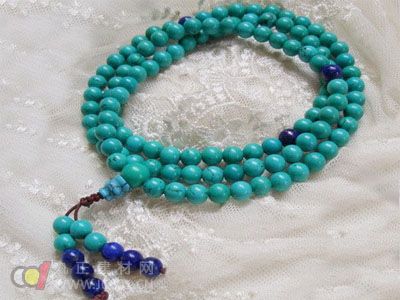Turquoise maintenance method introduction
Introduction to Turquoise Care Methods:
Turquoise is a delicate gemstone that requires special care during both wearing and collection. It has a relatively low hardness compared to other gemstones, making it prone to scratches and wear. Additionally, turquoise is chemically unstable and can be easily damaged by acids, which may cause it to dissolve or discolor. High temperatures can also affect its appearance, causing fading or cracking, especially if exposed to direct sunlight for long periods.
One of the main challenges in caring for turquoise is its porous nature. It can absorb oils from the skin, such as hand oil, lip balm, and perfume, which may lead to discoloration over time. In traditional Chinese craftsmanship, a thin layer of paraffin is often applied to the surface of turquoise to enhance its color and protect it from external elements. However, even with this protection, it's still important to avoid excessive contact with cosmetics, oils, and sweat to maintain the stone’s beauty.
When identifying turquoise, it's crucial to avoid using heavy liquids like tribromomethane or diiodomethane, as these substances can permanently discolor the stone. Turquoise is also sensitive to pollution and should not come into contact with tea, soapy water, oil, rust, or alcohol, as these can penetrate its pores and damage the gem.
Turquoise is highly sensitive to heat. Direct exposure to fire or intense sunlight can cause it to fade, crack, or even break. Prolonged exposure to high temperatures can lead to structural damage, making the stone brittle and fragile. This is particularly important when dealing with jewelry made with silver, as silver conducts heat quickly and can accidentally damage the turquoise during repairs. If the turquoise is set in metal, extreme heat can cause it to crack or fall out.
Due to its softness, turquoise should be kept away from hard objects or other jewelry that could scratch or chip it. It should never be cleaned in an ultrasonic cleaner, as the vibrations can cause internal damage, especially if the stone has natural pores. Even dense turquoise can be harmed if it comes into contact with other items during the cleaning process.
Some imitations or cheaply made turquoise jewelry, especially from Indian markets, may look attractive but are difficult or even impossible to repair if damaged. Therefore, it's always wise to handle turquoise with care and invest in proper maintenance to preserve its value and beauty over time.

CS08A High Torque Precision Electric Screwdriver Set With Pen Clip
SUZHOU CREATION SPACE INTELLIGENT TECHNOLOGY CO.,LTD , https://www.mypkey.com